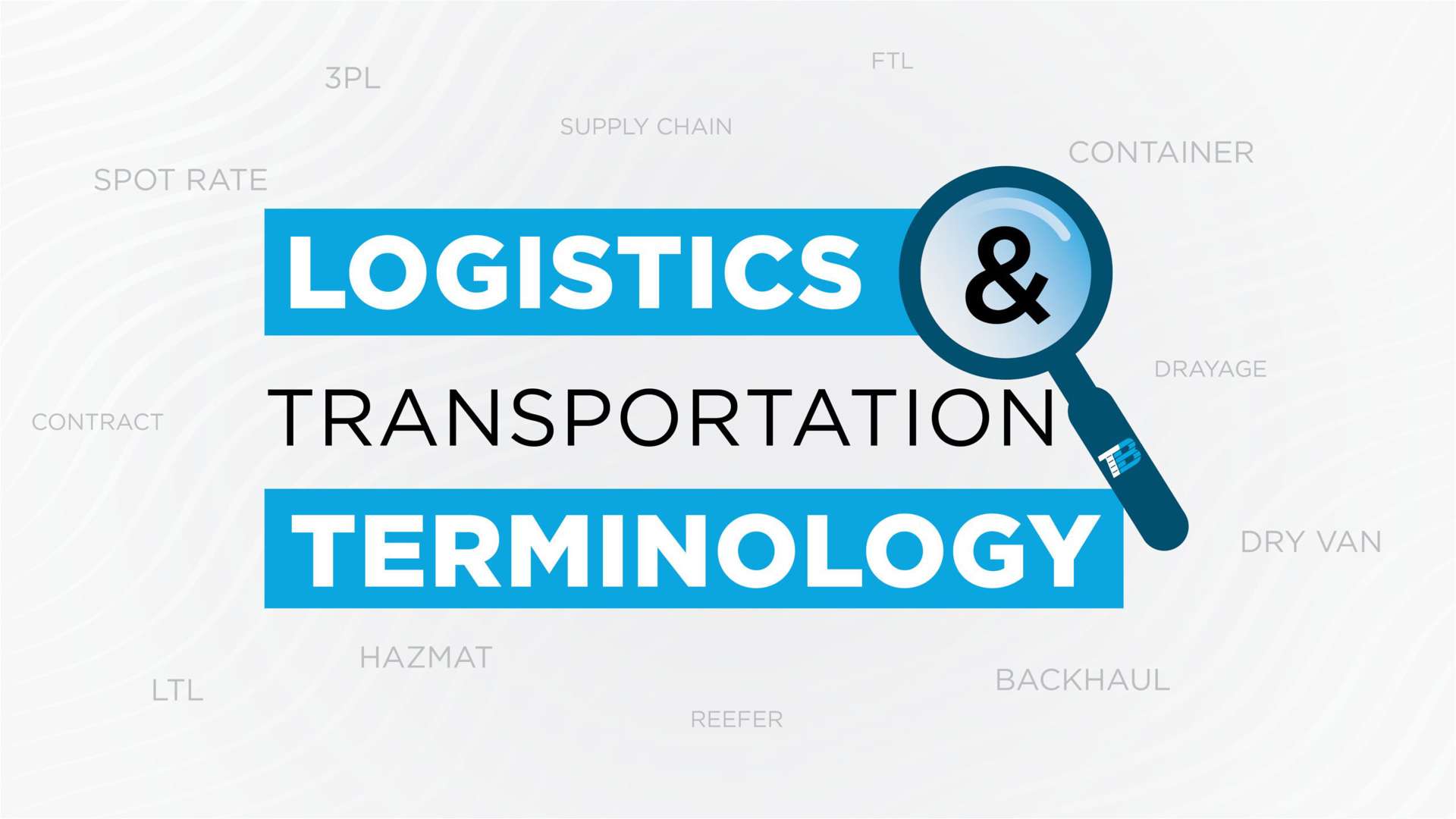
Glossary of Logistics & Transportation Terms
Logistics Definitions
- 3PL: “3PL” stands for “third-party logistics”. It refers to a company that offers logistics services to other businesses and helps manage their supply chain. This can include services such as transportation, warehousing, inventory management, and more.
- Accessorial Charge: Amount billed for additional, supplemental, or special services provided, usually a flat fee. Examples include tarps, dunnage, layovers, detention, etc.
- Bill of Lading (BOL): A document between a shipper and carrier acknowledging the receipt of goods for transport. It also includes information about the cargo type, quantity, weight, origin, and destination.
- Carrier: A company that transports freight shipments from one location to another, typically on owned assets, by ocean, air, or land.
- Consignee: The individual or company receiving a shipment.
- Commodity: Any product that can be bought or sold, including raw materials, manufactured goods, or grown products.
- Distribution Center (DC): A location where goods and materials are stored until they are ready to be moved to their end destination.
- Freight Broker: An intermediary, either an individual or a company, connects people or businesses that require shipping services with authorized motor carriers. They determine the needs of the shipper and connects them with a carrier capable of transporting their freight at an acceptable price.
- Logistics: The planning, coordination, and management of the movement of goods from one place to another. The goal of logistics is to ensure that the right products are delivered to the right place at the right time, while minimizing costs and maximizing efficiency.
- Supply Chain: The system linking organizations, activities, information, and resources to obtain, manufacture, and transport goods from origin to destination. This usually involves moving products from suppliers to end customers.
Transportation Definitions
- Cargo Insurance: Cargo insurance is a type of insurance policy that provides coverage for loss or damage to goods and merchandise while they are in transit, typically by sea, air, or land. Cargo insurance may be purchased by the shipper or carrier, and the policy may vary depending on the type of goods being transported, the mode of transportation, and other factors.
- Container: Standard-sized rectangular box used to transport freight by ship, rail or highway. International shipping containers are 20’ or 40’, conform to International Standards Organization (ISO) standards and are designed to fit in ocean vessels. Domestic containers are up to 53’ long, of lighter construction and are designed for rail and highway use only.
- Department of Transportation (DOT): Government agency responsible for setting and overseeing safety regulations for all forms of transportation within the United States. This includes the U.S. federal highway, air, railroad, and maritime transportation.
- Door to Door: A type of shipping service where the cargo is picked up at the door of the shipper and delivered to location of the receiver.
- Drayage: The short-distance transport of goods by truck or other motorized vehicle, usually between a port or rail yard and a nearby warehouse or distribution center. Because of the role it plays in intermodal transportation, it is sometimes also called intermodal trucking.
- Dunnage: Filler material placed in empty spaces to keep cargo from moving or falling during transport. Common materials used include lumber, foam padding, and inflatable bags.
- Freight Class: In less than truckload (LTL) transport, shipments are assigned a class based on their density, value, and handling requirements. This classification system, created by the National Motor Freight Traffic Association (NMFTA), is one of the main factors determining the rate charged for an LTL shipment.
- Fuel Surcharge (FSC): To account for fluctuations in fuel costs, transportation companies may add a Fuel Surcharge (FSC) to the cost of shipping. This surcharge is based on either cents per mile or a percentage of the line haul amount.
- Hazmat: Short for “hazardous materials”, hazmat refers to any substance that is potentially harmful or dangerous to people, animals, or the environment. These materials require special handling and safety precautions during transportation to make sure they are not released.
- Intermodal Transportation: When a shipment is moved using more than one mode of transportation such as rail and truck or truck and ship.
- Lane: A move from point A to point B. Many companies will have a lane that they run on a regular basis called a “dedicated lane”.
- Motor Carrier Number (MC#): An identification number assigned to carriers by the Federal Motor Carrier Safety Administration (FMCSA) to verify their operating or trucking authority. Motor Carrier Numbers are necessary for commercial transportation companies, and any company vehicles transporting goods across state lines.
- Over-Dimensional Cargo: Cargo that is larger than the legally defined limits for width, length, height, and/or weight and cannot be broken down into smaller units.
- Oversized Freight: any load that exceeds the standard legal size and/or weight limits for a particular route. In most US states this includes loads that are wider than 8’ 6″ or taller than 13’ 6″. Loads that are excessively long (combination length) or heavy (total or per axle) also fall into the oversized category.
- PRO Number: The PRO number is an identification number assigned by the carrier to reference the shipment. It is also used for tracking.
- Proof of Delivery (POD): Signed documents (usually a Bill of Lading) that show a shipment was received at the delivery location.
- Rate Confirmation: A document that confirms the agreed upon amount for the cost of service between the shipper and carrier.
- Reefer: A trailer with insulated walls and a self-powered refrigeration unit that is commonly used for transporting perishable and temperature-sensitive goods.
- Refrigerated Freight: Refrigerated freight includes shipments that require a temperature regulated trailer. Refrigerated trailers have a large capacity climate control unit mounted on the front of the trailer and run off a secondary fuel supply. The trailers can be partitioned for zoned temperature control. Refrigerated shipments generally consist of perishable food, medical supplies, or chemicals.
- Thru Trailer Service (TTS): When cargo remains on the same trailer during an international shipment. This is the opposite of a trans-load and is generally considered safer by most companies.
- USDOT Number: An identification number assigned to carriers by the Federal Motor Carrier Safety Administration (FMCSA). It is required of all companies transporting cargo across state lines.
Trucking Definitions
- Backhaul: The return movement of a transportation vehicle from its delivery point back to its point of origin.
- Chassis: The structural skeleton of a truck that serves as a platform that a container is placed on and contains the essential parts of the vehicle such as axles, engine, cab, fuel tank, and batteries.
- Contract Freight: A long-term pricing agreement between a shipper and carrier, where a carrier offers fixed pricing for a committed volume of freight.
- Deadheading: The practice of driving a commercial truck while it’s empty, without any cargo or freight in the trailer. Deadheading typically occurs when a truck is being driven to its next pickup location or delivery point.
- Dedicated Truck: Refers to a driver pulling freight for one specific customer only, where only that load is on the truck. No partial loads can be added.
- Domestic Transportation: The transportation of goods within a country by land or air.
- Dry Van: Dry van trailers are covered trailers with a flat deck and are the most common type of trailer used for freight transportation in the US.
- Full Truckload (FTL): Refers to shipments that require a full container for transport. When shippers use FTL, the container is dedicated to their shipment only.
- Last Mile: When a truck transports cargo over a short distance to deliver it to the final destination, like from a storage warehouse to the consignee’s facility.
- Less Than Truckload (LTL): Refers to shipments where the quantity of freight does not require a full dedicated container. Often a carrier will place several LTL shipments on the same truck to reduce the cost to the shipper.
- Owner-Operator: A truck driver who owns and operates their own trucking business.
- Spot Rate: In the trucking industry, a spot rate is the fee a shipper pays to transport a single load or shipment at the prevailing market rate. Spot rates are a type of short-term pricing that reflects the current balance between the supply of available carriers and the demand from shippers in the market.
- Truck Order Not Used (TONU): When a shipper orders a truck to pick up but cancels after a truck has been dispatched. There is typically a fee associated with this.
Ocean & Sea Freight Definitions
- Barge: A flat-bottomed boat that is designed to transport goods and materials over the water. Barges are typically towed by a tugboat and are an efficient and cost-effective mode of transportation, particularly for moving large volumes of cargo between ports.
- Bridge: Another term for barge.
- Demurrage: Demurrage is a fee charged by a transportation company, such as a shipping line or a railroad, when a customer takes longer than the allotted time to load or unload cargo at a terminal or port.
- Detention: A charge imposed by the carrier or shipper for excessive time spent at the pickup or delivery location beyond the agreed-upon time frame. These charges are intended to compensate the carrier or driver for the time spent waiting and encourage shippers and receivers to efficiently manage the loading and unloading of cargo.
- LoLo Barge: Stands for “load-on, load-off”, a type of barge designed to transport containerized cargo that is placed on the barge with cranes or other lifting equipment.
- Ocean Freight: Any shipment that is transported from one location to another via a ship or vessel.
- RoRo Barge: Short for Roll-on/Roll-off barge, is a type of barge equipped with ramps or other specialized equipment to accommodate different types of rolling cargo, including cars, trucks, trailers, and heavy equipment.
- Vessel: Another word for ship that refers to the vehicle in which ocean freight shipments are transported.
International Freight Definitions
- Electronic Export Information (EEI): A mandatory filing requirement for all exports from the United States that are subject to export controls or regulations. EEI is a data set that includes information like the exporter, recipient, commodity being exported, and mode of transportation.
- Freight Forwarder: A third-party logistics (3PL) provider that acts as an intermediary between shippers (the businesses shipping goods) and carriers (the service providers transporting the goods) to coordinate movement of freight around the world.
- Non-Vessel Operating Common Carrier (NVOCC): A transportation intermediary with the same capabilities as an ocean carrier but does not own their own ship. Instead, they lease or buy space from ocean carriers and then contract that space with shippers under their own Bill of Lading (BOL).

Expert logistics solutions, customized for your business.
With a full range of transportation services available, we work with you to find the most efficient and cost effective method of moving your freight – all while providing world-class customer service. Get in touch with our team today.
Stay Connected
Join the TB community to receive our quarterly newsletter, company updates, and valuable resource guides—created specifically to enhance your supply chain and support your success.

